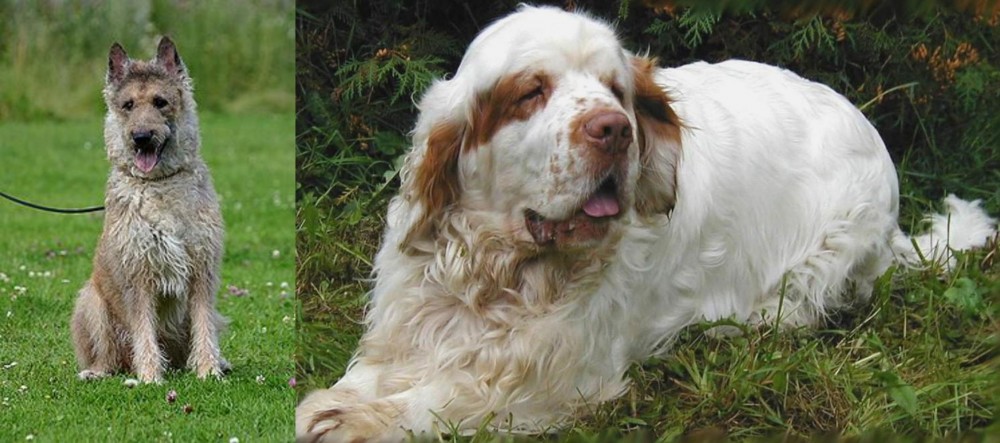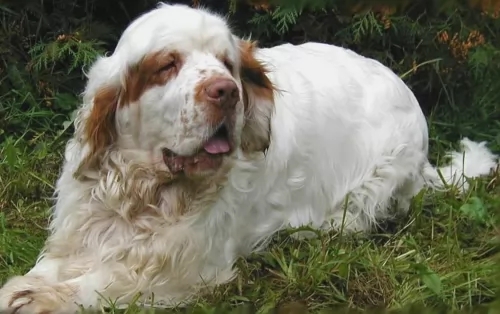 Petzlover
Petzlover Belgian Shepherd Dog (Laekenois) is originated from Belgium but Clumber Spaniel is originated from United Kingdom. Belgian Shepherd Dog (Laekenois) may grow 15 cm / 6 inches higher than Clumber Spaniel. Belgian Shepherd Dog (Laekenois) may weigh 9 kg / 19 pounds lesser than Clumber Spaniel. Both Belgian Shepherd Dog (Laekenois) and Clumber Spaniel has almost same life span. Belgian Shepherd Dog (Laekenois) may have more litter size than Clumber Spaniel. Belgian Shepherd Dog (Laekenois) requires Low Maintenance. But Clumber Spaniel requires High Maintenance
Belgian Shepherd Dog (Laekenois) is originated from Belgium but Clumber Spaniel is originated from United Kingdom. Belgian Shepherd Dog (Laekenois) may grow 15 cm / 6 inches higher than Clumber Spaniel. Belgian Shepherd Dog (Laekenois) may weigh 9 kg / 19 pounds lesser than Clumber Spaniel. Both Belgian Shepherd Dog (Laekenois) and Clumber Spaniel has almost same life span. Belgian Shepherd Dog (Laekenois) may have more litter size than Clumber Spaniel. Belgian Shepherd Dog (Laekenois) requires Low Maintenance. But Clumber Spaniel requires High Maintenance
 The Laekenois, from a variety of 4 Belgian Shepherds, and one of the rarest, is a working- or herding breed of dog which originated in Belgium. It is believed to have been around since the Middle Ages. The intelligent dog was also used for sending messages during the 1st World War. In most countries, all 4 of the dogs are considered the same breed with different varieties in coat types, but there are some instances where they are recognized as separate breeds.
The Laekenois, from a variety of 4 Belgian Shepherds, and one of the rarest, is a working- or herding breed of dog which originated in Belgium. It is believed to have been around since the Middle Ages. The intelligent dog was also used for sending messages during the 1st World War. In most countries, all 4 of the dogs are considered the same breed with different varieties in coat types, but there are some instances where they are recognized as separate breeds.
An interesting aspect of these dogs is that until the advent of dog shows in the 1900s, the 4 varieties were intermixed, and today purebred Laekenois can sometimes give birth to smooth-coated puppies which can be registered as Malinois.
 Ever since winning in Confirmation at Westminster Kennel Club’s annual show, the popularity of the Clumber Spaniel has increased markedly. The breed of Clumber Spaniel comes from the United Kingdom and it is the largest of all the spaniels. The breed is named for the Clumber Park where it was developed in Nottinghamshire. The Clumber Spaniel a=was designed to be a gundog or hunter in heavy weeds or cover. They have been popular with the Royal Family and were kept by King George V, King Edward VII, and Prince Albert.
Ever since winning in Confirmation at Westminster Kennel Club’s annual show, the popularity of the Clumber Spaniel has increased markedly. The breed of Clumber Spaniel comes from the United Kingdom and it is the largest of all the spaniels. The breed is named for the Clumber Park where it was developed in Nottinghamshire. The Clumber Spaniel a=was designed to be a gundog or hunter in heavy weeds or cover. They have been popular with the Royal Family and were kept by King George V, King Edward VII, and Prince Albert.
It is possible that during the French Revolution, the Duc de Noailles gave his spaniels to the Duke of Newcastle in Nottinghamshire, These spaniels, Alpine Spaniel, are extinct. At the time they were bred with Basset Hounds and Great Pyrenees.
Another line of thought has the Clumber Spaniel descending form an ancient Bleinheim Spaniel, which was used to later develop the King Charles Spaniel.
Whichever theory is true, we know that they were first bred and improved by William Mansell. They were shown in 1859 in England. They were bred almost exclusively by nobility until the mid-19th century. Then World War 1 caused all breeding to be discontinued and the number of Clumbers declined drastically, only to be redeveloped after the was by King George V.
The Cumber won Best in Show at the prestige’s Crufts 1991 Centenary Show. When the American Kennel Club recognized the Clumber Spaniel, there were only 9 other breeds officially recognized. They came to Canada in the same year of 1884. They are also recognized by the UK Kennel Club as a Vulnerable Native Breed. A Clumber bred by Doug Johnson won Best in Show at the 1996 Westminster Dog Show.
The Clumber Spaniel is a loyal, gentle soul who is not very friendly with strangers. They shed all the time and snore loudly.
 The Laekenois is a highly talented dog, highly energetic and extremely intelligent. He will make a superb family pet with owners who are firm and fair with him. The dog is bright, obedient, protective and somewhat territorial. He’ll guard what he believes is his as he is instinctively protective.
The Laekenois is a highly talented dog, highly energetic and extremely intelligent. He will make a superb family pet with owners who are firm and fair with him. The dog is bright, obedient, protective and somewhat territorial. He’ll guard what he believes is his as he is instinctively protective.
He will get on well with children in the home, and he can also be socialized to get on well with other pets in the home. Of course, the way an owner treats the dog, and any other dog for that matter, brings out different temperaments in a dog. To get the best from him he should be trained and socialized from an early age. He will need plenty of exercise if you don’t want him becoming destructive from sheer boredom.
The body is well proportioned, muscular and sturdy. He has an alert, intelligent face with erect ears, bright brown eyes and the nose black. The hair is dense on the long tail, but with no feathering like with the other breeds. The most common color is fawn with a reddish undertone. The chest is deep and the legs strong and straight. The Laekenois's medium length rough, wire coat can include colors from fawn to brownish and black in between.
 The Clumber Spaniel is heavy-boned, with a very large head and a square muzzle. Of all spaniels, he is the biggest. His expressive face wears a dopey, sad look and his eyes are large, shaped like leaves. The muzzle is as large as the head and his nose is square. He has freckles on his muzzle and a deep chest. His legs are straight, and his feet are solid.
The Clumber Spaniel is heavy-boned, with a very large head and a square muzzle. Of all spaniels, he is the biggest. His expressive face wears a dopey, sad look and his eyes are large, shaped like leaves. The muzzle is as large as the head and his nose is square. He has freckles on his muzzle and a deep chest. His legs are straight, and his feet are solid.
The Clumber Spaniel gives off a dignified air and despite his expressions, he is ready to play or to work at any time.
 The Belgian Laekenois is an energetic herding breed dog, and even though he will do well in an apartment if he is sufficiently exercised, big gardens and farms would be first choice for him. Wherever you offer him a home, make sure to exercise him regularly and give him plenty of attention, as he loves his human family.
The Belgian Laekenois is an energetic herding breed dog, and even though he will do well in an apartment if he is sufficiently exercised, big gardens and farms would be first choice for him. Wherever you offer him a home, make sure to exercise him regularly and give him plenty of attention, as he loves his human family.
He’ll make an exceptional watchdog and because he is so intelligent, he learns easily, responding readily to his owner’s instruction. He’ll protect his human family with his life. Social, lively, attractive and bright, anybody who has owned a Laekenois will vouch for his loyalty and devotion, making him a splendid pet.
 The lifespan of the Belgian Laekenois is between 10 and 14 years of age, and he is a pretty robust breed, not prone to getting sick easily. However, as with most other dog breeds, he is predisposed to some concerning health conditions.
The lifespan of the Belgian Laekenois is between 10 and 14 years of age, and he is a pretty robust breed, not prone to getting sick easily. However, as with most other dog breeds, he is predisposed to some concerning health conditions.
A frightening health issue in Belgian Shepherds is inherited epilepsy. It occurs in all four varieties. Your dog will have uncontrollable shaking that can last a few minutes. There are many causes of seizures but it is mostly an inherited disorder.
The most common eye disease is cataracts.
This is an inherited disease that causes the joints to develop improperly. He may even have difficulty getting up from lying down.
 The Clumber Spaniel can suffer from a variety of conditions due to its very design and genetics. Lameness early in life can be attributed to the large and fast-growing bones in the Clumber. This lameness will dissipate when the pup is fully grown. Other issues include:
The Clumber Spaniel can suffer from a variety of conditions due to its very design and genetics. Lameness early in life can be attributed to the large and fast-growing bones in the Clumber. This lameness will dissipate when the pup is fully grown. Other issues include:
Can become dehydrated and all the problems that arise from a dog being overheated and dehydrated.
Must have a caesarian section. They may also have a sensitivity to the anesthesia used in the procedure.
Hypothyroidism with ear and skin complications.
They cannot take sulfa drugs.
 The long, double coat of your Laekenois will need to be trimmed about twice a year otherwise he could look dirty and unkempt. Certainly with the coat he has, you will need to brush him at least twice a week to get rid of all those loose hairs.
The long, double coat of your Laekenois will need to be trimmed about twice a year otherwise he could look dirty and unkempt. Certainly with the coat he has, you will need to brush him at least twice a week to get rid of all those loose hairs.
He is a well muscled, athletic, energetic dog and his food, whether home-made or commercially manufactured, needs to be a high-quality food high in protein and packed full of minerals and vitamins. If you’re not sure about food type, speak to your vet, because as a dog expert, they will advise you on food appropriate to this dog breed and his energy needs. Whether you own a male or female Laekenois, feeding should be such that weight for an adult is maintained around 25–30kg.
 The Clumber has a tendency to gain weight and become obese. Feed them wisely. Feed about ¼ to ½ of a cup of high quality dry dog food twice a day.
The Clumber has a tendency to gain weight and become obese. Feed them wisely. Feed about ¼ to ½ of a cup of high quality dry dog food twice a day.
This can be cervical or spinal. The discs can be bulging or ruptured. Can lead to paralysis if not treated properly.
Entropion with inward rolling of eyelid or Ectropion with outward rolling of eyelid.
The Clumber Spaniel is not the most energetic of canines. He still needs moderate exercise daily but don’t overdo it. Walks, fetch, swimming, chase or confirmation are good activities for a Clumber.